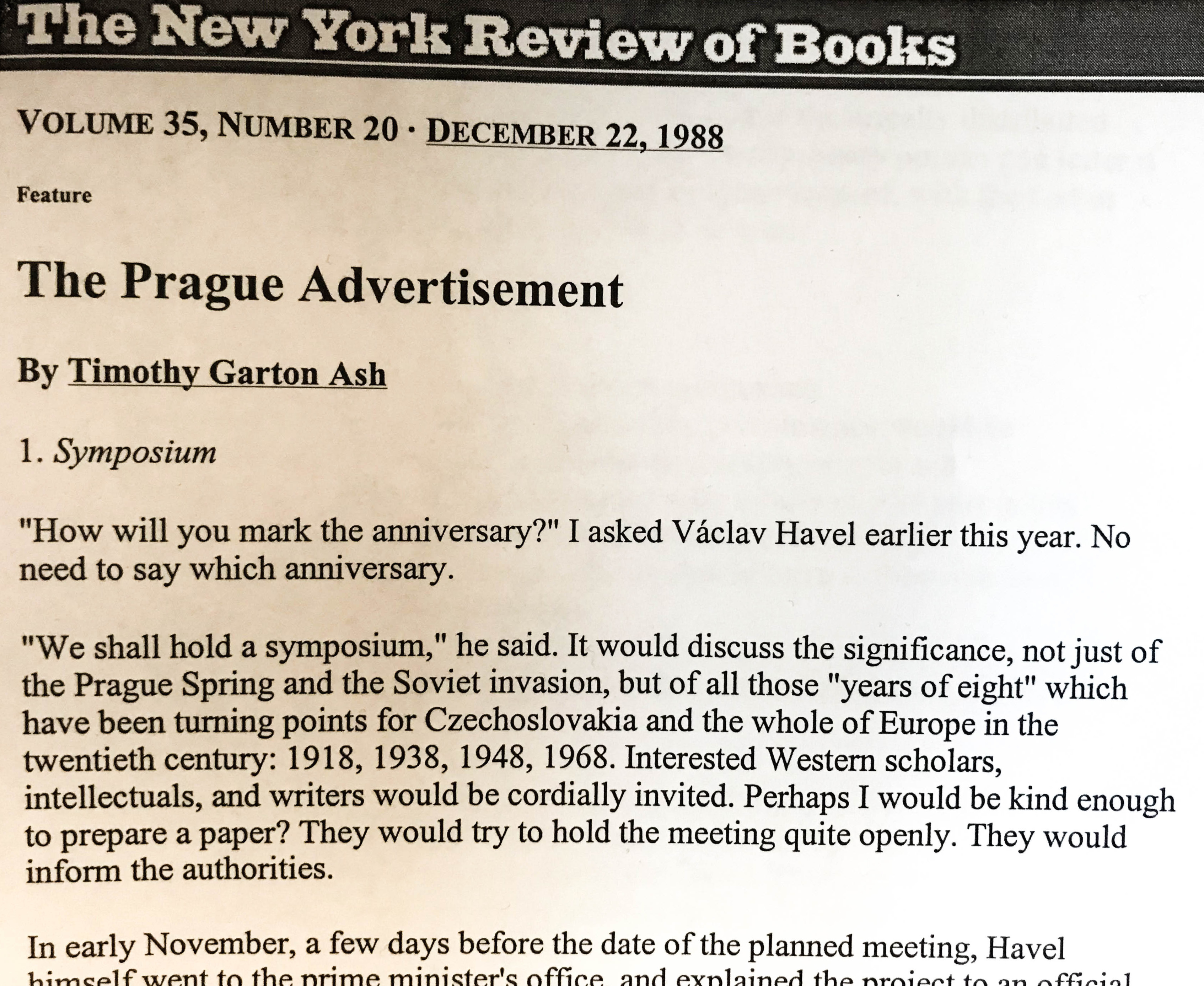By Erika Schlager,
Counsel for International Law
“How will you mark the anniversary?”
That’s what Timothy Garton Ash asked dissident playwright Vaclav Havel 30 years ago, prior to the 70th anniversary of the Czechoslovak state.
The answer? A symposium on the incidence of the number “eight” in Czechoslovak history: 1918 (the creation of the modern Czechoslovak state), 1938 (Nazi Germany’s invasion of Czech lands), 1948 (the Communist takeover), 1968 (the Soviet-led Warsaw Pact invasion that crushed the Prague Spring) . . . and 1988.
As a junior Helsinki Commission staffer, I attended that symposium. It was my first solo trip for the Commission.
At the time, the 35 signatories of the Helsinki Final Act were meeting in Vienna to review the implementation of the Final Act, negotiate new commitments, and schedule future meetings. Czechoslovakia—the Czechoslovak Socialist Federal Republic, to be more precise—had proposed holding a future meeting in Prague as part of the Helsinki process work on economic cooperation. And why not? Budapest, the capital of another one-party communist state, had managed to become the host for a cultural forum in 1985. In Vienna, the Soviet delegation had boldly proposed holding a follow-up meeting on human rights in Moscow.
However, Czechoslovakia—unlike Hungary, Poland or even the Soviet Union under Gorbachev—remained a firmly hardline communist regime through the 1980s, with significant restrictions on civil society. According to the U.S. Department of State at the time, freedom of assembly was severely restricted. Efforts to hold independently organized meetings or demonstrations systematically resulted in arrests, criminal prosecutions, assaults on persons attempting to hold such events, sometimes using water cannon, dogs, tear gas and truncheons. Nevertheless, as the Prague symposium approached, the United States had still not taken a position in Vienna on the Czechoslovak proposal.
Earlier in the year, authorities in Czechoslovakia disrupted efforts by independent peace activists to hold a meeting in Prague by refusing to allow foreigners to enter the country to participate. If Czechoslovakia was unwilling to allow openness and access at such meetings, was it fit to serve as the host of a Helsinki process follow-up meeting? The November meeting would be kind of a test.
My handler from the U.S. Embassy welcomed to my visit. The United States had recently declared a Czechoslovak diplomat in Washington persona non grata for actions inconsistent with his diplomatic status, a euphemism for spying. The U.S. Embassy, then led by Ambassador Shirley Temple Black, assumed it was only a matter of time before the Czechoslovak regime would kick an American out of Prague in retaliation. The embassy thought it might avoid that outcome if it cut off ties with dissidents. My visit gave the embassy’s political officer an opportunity to resume those ties. Still, he warned me, I might be the convenient target of retaliation.
Czechoslovakian authorities allowed foreign participants to attend the symposium, but by the time my plane landed, the principal organizers of the event, including Vaclav Havel, had been arrested. I was deposited at the Hotel Jalta, along with others who had come from abroad to participate. The small black and white television in my room had a neatly typed card in front of it that said in English, “Do not attempt to change the station.” I spun the dial at every opportunity.
This is where I first met Max van der Stoel, the former Dutch Foreign Minister and man of inestimable integrity who later became the OSCE High Commissioner on National Minorities. 
Eventually, Vaclav Havel was released, and I met with him and other dissidents before heading to a “parallel” symposium on “8s” organized by exiles in Vienna. In Vienna, I also reported to the head of the U.S. delegation to the Vienna Follow-up Meeting, Ambassador Warren Zimmerman, about the events in Prague.
On November 15, 1988, Ambassador Zimmerman announced the U.S. position on the Czechoslovak bid to host a follow-up meeting, noting that the lack of openness and access made U.S. endorsement impossible:
. . . [T]he pattern of repression in Czechoslovakia, together with the persistent efforts of the Czechoslovak delegation to secure approval for Prague as host of an economic follow-up, lead me to state for the record the U.S. position on the candidacy of Czechoslovakia . . . [A] prospective host should reflect commitment to openness and access, for its visitors and for its own citizens, that has been so well exemplified by the government of Austria at the Vienna meeting. By this simple and reasonable standard, the government of Czechoslovakia fails – and fails abysmally. For that reason, the United States will not join any proposal that any post-Vienna meeting be held in Czechoslovakia. That decision is irrevocable; it will not be subject to review or change during the life of the Vienna meeting.
In June 1989, an American diplomat – my control officer for the November symposium – was declared persona non grata by the Czechoslovak authorities, in retaliation for the U.S. expulsion of another Czechoslovak diplomat from Washington, and expelled one-month short of the end of his three-year tour.
In November 1989, the communist police violently broke up a peaceful pro-democracy demonstration and brutally beat many student participants. They also planted a false story in the opposition that a student demonstrator had been beaten to death. The secret police thought they would be able to reveal that the opposition report of a fatality was false and thereby discredit the growing dissident movement.
Their plan backfired.
Instead, as journalist Mary Battiata wrote, “a half-baked secret police plan to discredit a couple of dissidents apparently boomeranged and turned a sputtering student protest into a national rebellion.”
The United States continues to advocate for openness and access for civil society at meetings organized in the Helsinki process. Hopefully, it will continue to do so with the same firmness and determination it did 30 years ago.





